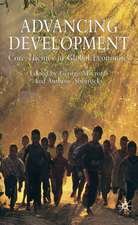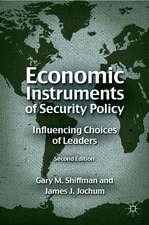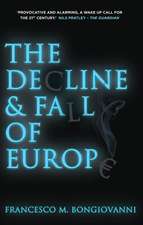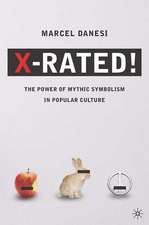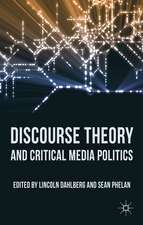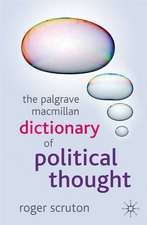Introduction to Post-Keynesian Economics
Autor M. Lavoieen Limba Engleză Paperback – 21 aug 2009
| Toate formatele și edițiile | Preț | Express |
|---|---|---|
| Paperback (2) | 492.40 lei 6-8 săpt. | |
| Palgrave Macmillan UK – 21 aug 2009 | 492.40 lei 6-8 săpt. | |
| Palgrave Macmillan UK – 2006 | 633.19 lei 6-8 săpt. | |
| Hardback (1) | 636.63 lei 6-8 săpt. | |
| Palgrave Macmillan UK – 15 iun 2007 | 636.63 lei 6-8 săpt. |
Preț: 492.40 lei
Preț vechi: 579.30 lei
-15% Nou
Puncte Express: 739
Preț estimativ în valută:
94.25€ • 102.41$ • 79.22£
94.25€ • 102.41$ • 79.22£
Carte tipărită la comandă
Livrare economică 22 aprilie-06 mai
Preluare comenzi: 021 569.72.76
Specificații
ISBN-13: 9780230229211
ISBN-10: 0230229212
Pagini: 164
Ilustrații: XIV, 164 p.
Dimensiuni: 140 x 216 x 13 mm
Greutate: 0.23 kg
Ediția:Revizuită
Editura: Palgrave Macmillan UK
Colecția Palgrave Macmillan
Locul publicării:London, United Kingdom
ISBN-10: 0230229212
Pagini: 164
Ilustrații: XIV, 164 p.
Dimensiuni: 140 x 216 x 13 mm
Greutate: 0.23 kg
Ediția:Revizuită
Editura: Palgrave Macmillan UK
Colecția Palgrave Macmillan
Locul publicării:London, United Kingdom
Cuprins
Introduction The Post-Keynesian Heterodoxy Heterodox Microeconomics A Macroeconomic Monetary Circuit The Short-Period: Effective Demand and the Labour Market The Long-Period: Old and New Growth Models General Conclusion
Recenzii
'Marc Lavoie has made many important and original contributions to our understanding of how modern economies work, using a broad post-Keynesian approach. In an Introduction to Post-Keynesian Economics he has written an overview that will be of great value to students and teachers alike. His exposition is clear and his prognosis and conclusions are sensible, practical and humane. Lavoie is well on top of modern techniques, but these never obscure his conceptual understanding and his feel for the historical settings of theoretical development.' - G. C Harcourt, Jesus College, Cambridge, UK.
'Professor Lavoie has written a very delightful and easy to understand primer on Post Keynesian economics. Placing it within the broader context of heterodox economics, Lavoie shows that Post Keynesian economics makes significant theoretical contributions to microeconomics, macroeconomics, effective demand, employment, and economic growth; and that the contributions are compatible with the contributions of other heterodox approaches. Clearly and elegantly summarizing the contributions of Post Keynesian economics in an open and non-biased manner and relating them to other heterodox approaches, Lavoie has produced a book that can be assigned to students so to introduce them in an unbiased manner to the wonders Post Keynesian-heterodox economics.' - Professor Frederic S. Lee, University of Missouri-Kansas City, USA.
'In the face of the present financial crisis and the deep world wide-recession (Post-)Keynesian economics, which has been downgraded by mainstream economists for several decades, has proven to be highly relevant again. Marc Lavoie's 'Introduction to Post-Keynesian Economics' gives a superb overview over methodology, microeconomics, monetary and macroeconomics, and the approaches to distribution and growth of this school of thought. Although it presents the material in a very condensed way the book remains highly readable. It can be recommended as a 'compass' for studying Post-Keynesian economics, both for students and senior researchers.' - Eckhard Hein, Berlin School of Economics and Law, Germany.
'Professor Lavoie has written a very delightful and easy to understand primer on Post Keynesian economics. Placing it within the broader context of heterodox economics, Lavoie shows that Post Keynesian economics makes significant theoretical contributions to microeconomics, macroeconomics, effective demand, employment, and economic growth; and that the contributions are compatible with the contributions of other heterodox approaches. Clearly and elegantly summarizing the contributions of Post Keynesian economics in an open and non-biased manner and relating them to other heterodox approaches, Lavoie has produced a book that can be assigned to students so to introduce them in an unbiased manner to the wonders Post Keynesian-heterodox economics.' - Professor Frederic S. Lee, University of Missouri-Kansas City, USA.
'In the face of the present financial crisis and the deep world wide-recession (Post-)Keynesian economics, which has been downgraded by mainstream economists for several decades, has proven to be highly relevant again. Marc Lavoie's 'Introduction to Post-Keynesian Economics' gives a superb overview over methodology, microeconomics, monetary and macroeconomics, and the approaches to distribution and growth of this school of thought. Although it presents the material in a very condensed way the book remains highly readable. It can be recommended as a 'compass' for studying Post-Keynesian economics, both for students and senior researchers.' - Eckhard Hein, Berlin School of Economics and Law, Germany.
Notă biografică
MARC LAVOIE is Professor in the Department of Economics at the Univeristy of Ottawa, Canada. He has been Visiting Professor at Curtin University, Australia, and at the univeristies of Bordeaux, Grenoble, Lille, Limoges, Nice, Rennes, Paris-1 and Paris-13. His main research areas are in post-Keynesian and monetary economics. He has written over 130 journal articles or book chapters as well as authoring Foundations of Post-Keynesian Economics. He is also co-editor of Central Banking in the Modern World.


